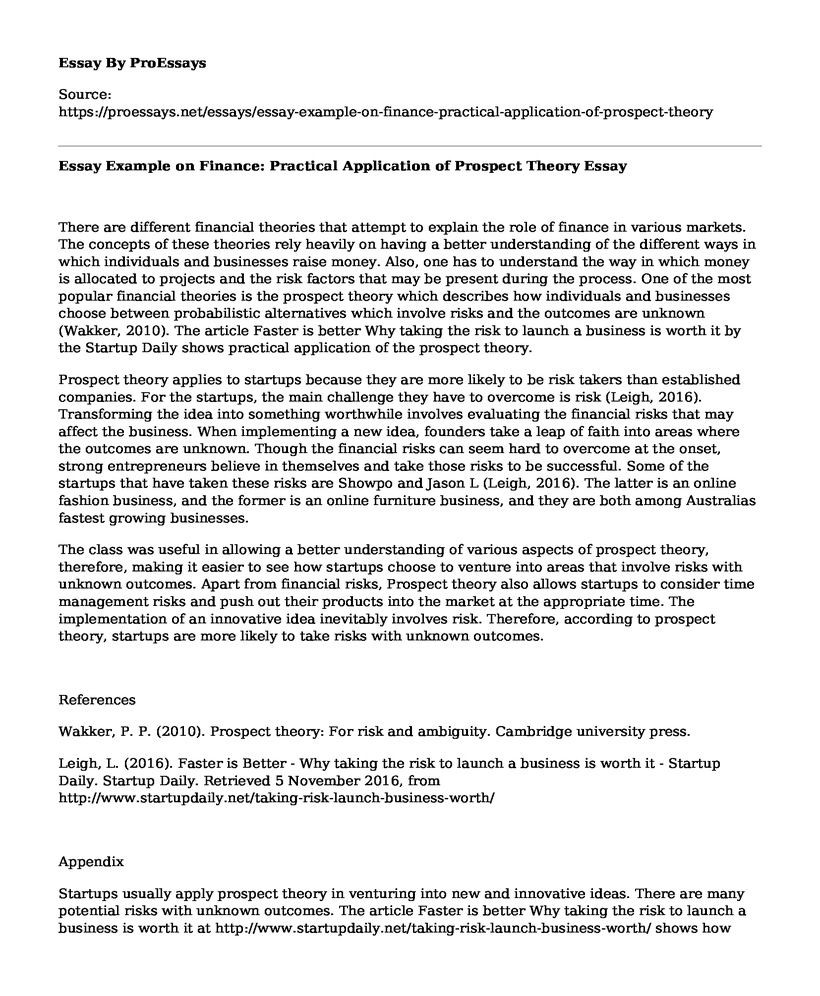There are different financial theories that attempt to explain the role of finance in various markets. The concepts of these theories rely heavily on having a better understanding of the different ways in which individuals and businesses raise money. Also, one has to understand the way in which money is allocated to projects and the risk factors that may be present during the process. One of the most popular financial theories is the prospect theory which describes how individuals and businesses choose between probabilistic alternatives which involve risks and the outcomes are unknown (Wakker, 2010). The article Faster is better Why taking the risk to launch a business is worth it by the Startup Daily shows practical application of the prospect theory.
Prospect theory applies to startups because they are more likely to be risk takers than established companies. For the startups, the main challenge they have to overcome is risk (Leigh, 2016). Transforming the idea into something worthwhile involves evaluating the financial risks that may affect the business. When implementing a new idea, founders take a leap of faith into areas where the outcomes are unknown. Though the financial risks can seem hard to overcome at the onset, strong entrepreneurs believe in themselves and take those risks to be successful. Some of the startups that have taken these risks are Showpo and Jason L (Leigh, 2016). The latter is an online fashion business, and the former is an online furniture business, and they are both among Australias fastest growing businesses.
The class was useful in allowing a better understanding of various aspects of prospect theory, therefore, making it easier to see how startups choose to venture into areas that involve risks with unknown outcomes. Apart from financial risks, Prospect theory also allows startups to consider time management risks and push out their products into the market at the appropriate time. The implementation of an innovative idea inevitably involves risk. Therefore, according to prospect theory, startups are more likely to take risks with unknown outcomes.
References
Wakker, P. P. (2010). Prospect theory: For risk and ambiguity. Cambridge university press.
Leigh, L. (2016). Faster is Better - Why taking the risk to launch a business is worth it - Startup Daily. Startup Daily. Retrieved 5 November 2016, from http://www.startupdaily.net/taking-risk-launch-business-worth/
Appendix
Startups usually apply prospect theory in venturing into new and innovative ideas. There are many potential risks with unknown outcomes. The article Faster is better Why taking the risk to launch a business is worth it at http://www.startupdaily.net/taking-risk-launch-business-worth/ shows how startups choose between probabilistic alternatives which involve risks with unknown outcomes which is the basis of the prospect theory.
Cite this page
Essay Example on Finance: Practical Application of Prospect Theory. (2021, Mar 25). Retrieved from https://proessays.net/essays/essay-example-on-finance-practical-application-of-prospect-theory
If you are the original author of this essay and no longer wish to have it published on the ProEssays website, please click below to request its removal:
- Geopolitical Tensions and International Business
- High Levels of Curative Health Expenditures
- Fundraising Plan for No Name Nonprofit
- Assignment Example on Mr. Jason's Financial Statements
- Essay Example on Aged People Denied Long-Term Care Insurance Benefits
- From Depression to Success: The Inspiring Journey of James Martin - Essay Sample
- 150 Years of St. Elizabeth Healthcare: A History of Providing Quality Care - Report Sample







